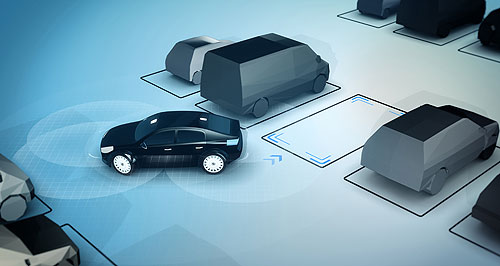Make / Model Search
News - General News - TechnologyClever parking reduces LA congestionCopy that: Xerox communications and marketing director Richard Harris addresses the Intelligent Transport Systems Summit in Melbourne this week. Online parking management technology cuts Los Angeles traffic15 May 2015 By IAN PORTER A STATE of the art intelligent transport system that uses real-time car-parking data has achieved a significant reduction of traffic in heavily congested parts of Los Angeles. The traffic management project was started by the LA city council after a survey revealed that, at any one time, 30 per cent of the cars in the central business district were circling the block looking for a parking space. Multinational information management specialist Xerox lead the project, which wired up 6000 off- and on-street parking spaces with sensors to indicate when individual places were unoccupied. Drivers looking for a space were then able to access the information online and make their way to a free park without having to do laps of the CBD hoping to find a space by chance. The project also looked at parking charge rates and altered tariffs in a number of zones, with fares increasing at 27 per cent of spaces but reduced by 60 per cent for others. Speaking at the Intelligent Transport Systems Summit in Melbourne this week, Xerox communications and marketing director Richard Harris said the project had resulted in a significant reduction of congestion. “We managed to reduce that number of circling cars by 10 per cent,” he said. “Ten per cent of 30 per cent doesn’t sound much, but if you have 30 per cent of traffic just looking for spaces, that’s a lot of traffic. “By changing the price and giving them information, you can influence how they travel. “Revenues actually went up two per cent, but that was not the aim. The reduction in congestion and cars circling was the point.” Parking rates are revised on a monthly basis and are published online along with space availability, allowing commuters to decide between driving or public transport. A recent survey in the UK showed that most people spend between 10 and 20 minutes looking for an on-street parking space. “If you extrapolate by the number of vehicles going into Birmingham or Bristol or Manchester, you’ve got a huge amount of congestion, frustration and waste,” said Mr Harris. Mr Harris explained there were several ways councils or municipal authorities could use intelligent transport systems (ITS) to alleviate congestion, or move it somewhere else. The basic requirement was an urban traffic control system that controls traffic lights and knows how heavy traffic is at various points. “If congestion is inevitable, we should be smart enough to decide where we want the congestion to be,” he said. “Let’s move it to where it causes the least amount of damage. “If it’s on a motorway, let’s have the congestion away from the junctions so that the junctions still flow. So let’s hold the traffic back, slow it down, before it gets to the junctions. “If it’s in cities, let’s have the congestion away from the schools and hospitals, for instance. “There is no reason why we can’t be a bit smarter about how we manage this pro-actively rather than just letting it happen and trying to solve the problem. “Just changing the cycle times on the traffic lights will manage the flow of vehicles into or out of the city, so you can protect particular areas.” With all on-street and off-street parking monitored, the system gives councils flexibility compared with the days when parking and traffic was managed by street signs. Mr Harris said the air quality in the UK was adversely affected two weeks ago when pollution from a North African dust storm made it all the way the UK. “If you have bad air quality and you have something that influences people’s behavior, it gives you an option,” he said. “You might raise the parking price so some people don’t drive into town.” Mr Harris admits there are many cities in the world that don’t need a “super-whizzy” system like that installed in Los Angeles. “In the Middle East – Abu Dhabi, Dubai – they have very poor parking discipline. They double-park, triple-park, block the roads,” he said. “In Oporto in Portugal, they have an unwritten understanding that anyone can park anywhere for 10 minutes while they pop into the shops or the bank. “It’s chaos, absolute chaos.” Just getting parking discipline as a first step can make a huge difference in traffic flow, said Mr Harris. Xerox became widely known for its photocopying machines in the early 1960s, but now earns around 40 per cent of its revenue from IT-based services to governments and business.  Read more15th of May 2015  US trial to test how ITS and automation combineAutonomous transportation system could be operating in Michigan early next decade14th of May 2015  New tech enables road-funding trialTransurban to test driver attitudes to new ways of paying for roads18th of September 2013  Safety question on vehicle-to-vehicle GPS systemsNSW tests show GPS not always accurate enough for new anti-crash technologies20th of March 2013  Watch out for the traffic jam hackersPaper shows how anyone can turn the daily commute into a nightmare |
Click to shareGeneral News articlesResearch General News Motor industry news |











Facebook Twitter Instagram